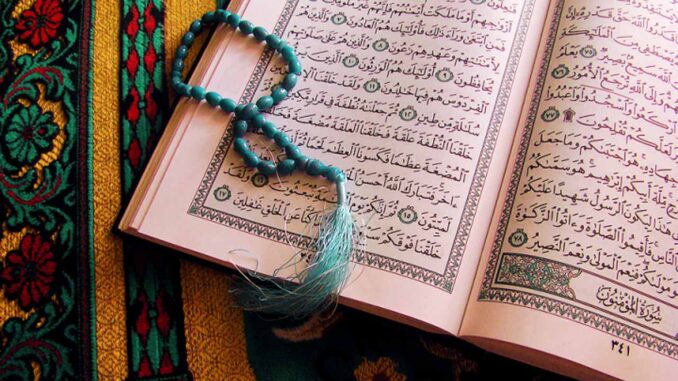
In the name of the Almighty, the Beneficent, the Merciful
“And if you should count the favors of the Almighty”, so says the Almighty, “you would not be to enumerate them; indeed, He is oft forgiving and Merciful” (Quran 16: 18).
In Arab-Islamic tradition, at least two words are usually made use of as synonyms for gratitude. The first is al-Ḥamd while the second is al-Shukr.
Muslim jurists, linguists, rhetoricians and exegetes have produced prodigious works on the semiotics of the two concepts and their implications in Muslims’ intellectual tradition. For example, Ibn Manzūr, the popular Arab rhetorician has posited that the word al-Ḥamd (praise) is teleologically not exactly the same thing as al-Shukr (gratitude). Whereas the antithesis of the concept al-hamd is al-Dhamm (blame), the antithesis of al-Shukr (gratitude) is al-Kufr (ingratitude). Now a closer analysis of these two concepts become urgent.
The word al-Hamd (the praise) or hamd (praise, without article ‘the’) appears in at least four different formats in the Quran. The first, which is unarguably the most engaging is that in which the concept is used in reference to the Almighty as the Creator of the world. In such instance, the verses of the Quran which bear the imprints of praise and which appear independently or as part of a longer verse therefore reads ‘al-Hamd lillaah – (Praise is due to Allah). This construction occurs in nothing less than twenty- three aayaat of the Quran. In all of these instances, the concept Hamd is employed generically. In other words, it is sometimes used or invoked by the Almighty in form of self-praise for appropriating and undertaking the equally self-generating task and obligation of sustaining and preserving the world. Thus, praise becomes His sole privilege and an attribute that finds expression accordingly in the aayat -al-hamd lillah rabbil alamin. This is referenced in six different portions of the Quran. They are Quran 1: 1, 3: 45, 12: 10, 37: 182, 37: 175, and 40: 65.
The second Quranic discourse of praise which bears the imprints of gratitude concerns itself with the provision of details of those subtle locales and stations in existence and the cosmos where recipients of the favours and blessings from the Almighty become aware of those favours and become consequently obliged to praise Him and show gratitude for same. Here praise for favours made possible and brought into existence out of non-existence by the Almighty Allah are detailed. This occurs at both the dyadic and triadic levels. Whereas the dyadic level refers to the spectrum of gratitude which features the Benefactor and the benefit-as-beneficiary, the triadic level is polyphonic in nature. It features the Benefactor, the benefit and the beneficiary. This probably explains the injunctive nature of the invocation of al-hamd lillaah not al-shukr lillaah (gratefulness to Allah) in Muslim’s daily ritual as are evident, among others in Quran 17: 111, 27: 59, 27: 93.
The third and fourth ‘praise’-discourses in the Quran are those preceded with two prepositions- ‘b’ (ب) and ‘l’ (ل). In the first, believers are enjoined to glorify His name with “praise” – fa sabbih bihamd rabbik. This occurred in nothing less than 24 verses of the Quran including Quran 20: 130, 45: 7, and 39: 75. The fourth usage establishes the right of the Allah to be praised and celebrated at all times and that all glorifications should be directed at His munificence. “To Him belongs all praises” so says the Quran in 29: 70, 30: 19, 45: 36 and 64: 1.
It is thus evident that al-hamd enjoys an extremely sacerdotal and pivotal status in Islamic hermeneutics on gratitude. But this is tentative when juxtaposed with Al-Shukr (thankfulness or gratitude). While the former is usually employed strictly in reference to the Almighty, al-Shukr functions diachronically between the realm of the sacred and that of the profane. In other words, Islamic tradition, the subtle differences between the literal and codal usages of the two concepts are more engaging than ordinarily thought of. Whereas the locale of al-Shukr is the material, the physical, that of al-Hamd is the immaterial, the spiritual; while the first is manifested in the usage of human body organs as tool with which gratitude is expressed (al-Jawārih), divine-praise (al-tahmid) is consummated/realized only on the tongue and in the heart (bil-lisān wa bil-qalb). This explains why the penitent is enjoined to embark on the prostration of gratitude (sajdah al-Shukr) not prostration of praise (sajdah al-tahmid),
Now in expressing gratitude, the believer becomes al-Shākir (Quran 16: 121 and 76: 3). But again, this has implication for the slippery notion of this category as it is one of the eminent and prominent attributes of the Almighty (Quran 2: 158 and 4: 147). Thus, the category becomes a merger between the sacred and the profane, between the Creator and the created; while, on one hand it figures as an attribute of God, it, on the other, as, in line with Ida Zilio-Grandi (2012), as an adjective of “the virtuous of the man; a practice of God, duty of man”, (46-51).
END

Be the first to comment